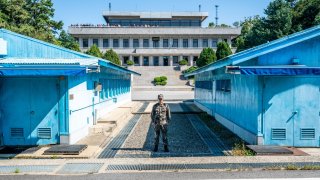Modernizing Korea’s United Nations Command
A shift in Korean leadership and the strategic landscape has altered the ROK’s discourse on and enhanced US efforts to bolster the UNC. More than any previous ROK administration, the Yoon administration has pushed to modernize the UNC and sought to shape the process.
Additionally, as concerned as U.S. commanders are about the ROK’s retaliatory rhetoric and potential actions, UNC member states have reservations, too. They do not see enhanced UNC involvement as grounds to threaten retaliation nor want to commit themselves to such a situation militarily. One of the best analysts of the UNC notes that the earlier UNC revitalization effort was unable to address key concerns, namely that the United States rather than the UN maintained unilateral control over the UNC and that the U.S. treaty commitment to the ROK “relegated the UNC to a role of being a multinational force provider to the bilateral combatant command.” Such concerns likely persist. A security crisis in Korea will bring these reservations to the fore and manifest, even if through quiet diplomatic channels, in UNC member states calling for ROK restraint rather than encouraging retaliation.
Finally, overstating or mischaracterizing the UNC’s role may accelerate dueling escalatory narratives on the peninsula and in the region. For example, consistent with its longstanding position on the UNC, the North Korean Foreign Ministry responded to Germany’s UNC accession by saying it was an “act of wrecking peace and stability on the Korean peninsula and aggravating the situation” and the “ever-escalating military confrontation on the Korean peninsula demands the DPRK take more thorough measures for bolstering up its self-defensive capabilities to defend the sovereignty, security and interests of the state.” Chinese voices have echoed such sentiments.
Xinhua News framed Germany’s accession as a U.S.-driven effort to pressure other countries to join the UNC—a command the dissolution of which Beijing has pushed for since the early 1970s—and create a small NATO in East Asia, which undermines regional and global security. Various Chinese netizens have echoed the narrative and promoted strengthened China-Russia strategic cooperation to safeguard regional peace and security jointly.
Such rhetoric is expected. For some, it shows UNC modernization’s effectiveness alongside the development of a broader minilateral security architecture. Pyongyang now faces and must condemn more multilateral partners. Beijing, too, is watching an array of states in Europe and the Indo-Pacific more overtly call out and push back against its assertive and destabilizing behavior. However, a more restrained perspective would counsel against mischaracterizing or overselling the UNC’s purpose and capacities. It risks accelerating a potential crisis for which it may not be properly prepared, provides adversaries fodder to distort public understanding, and takes escalatory counteractions (which, admittedly, they show every indication of taking anyway). After all, many of the critiques Pyongyang and Beijing level against the UNC resonate in South Korea and elsewhere.
The Bigger Picture
UNC modernization’s complications reflect the turbulent institutional history of a command that has meant different, sometimes contradictory things to its various stakeholders at different points in time. For Washington, it provided a mechanism to command multinational forces and garner international legitimacy for its participation in the Korean War. However, U.S. officials deemphasized and even sought ways to scrap the UNC in the 1970s—as important functions were transferred to Seoul or the U.S.-ROK alliance—yet moved to reenergize it following the end of the Cold War.
The ROK was once abjectly dependent upon the UNC. But given Seoul’s remarkable transformation, it bucks any attempts to restrict its hard-won agency. Nonetheless, Seoul cannot avoid that its one and only ally, upon whom it has depended for its ultimate national security for its entire sovereign existence, still commands the UNC. Finally, UNC member states have undergone stark undulations in their own commitments. After the Korean War, some left the command and never returned. Others departed but then rejoined yet with widely varying levels of commitment. Moreover, there is a significant legal gray area surrounding the command, given its multiple stakeholders, tenuous connection to the United Nations, and complicated institutional evolution.
Nevertheless, efforts are undoubtedly underway to enhance the UNC. If there is political will and continuity in the effort, it can be more proactively transformed and even, to an extent, redefined. However, careful, consistent, and cohesive communication between Seoul, Washington, and UNC member states and with their publics about the purpose the UNC serves and—importantly, does not serve—will be critical.
About the Author: Dr. Clint Work
Dr. Clint Work is a fellow and director of Academic Affairs at the Korea Economic Institute of America (KEI). KEI is registered under the Foreign Agents Registration Act (FARA) as an agent of the KIEP, a public corporation established by the government of the Republic of Korea. Additional information is available at the Department of Justice, Washington, DC.
Image: Keitma / Shutterstock.com.


